#there is nothing to indicate the passage of time in the show so this is just coming from favreau
Text
so was anyone going to tell me that the mandolorian takes place over the course of THREE YEARS or did I have to figure that out myself by looking up star wars timeline articles!!?
#mando#the mandolorian#like.....what#here I though - 14 months max#but NO#din and grogu were bopping around for two years before going to luke#and then grogu was with luke for a YEAR!?!?!#which just#the IMPLICATIONS#the fact that then#if we're looking at boba fett#din basically spent probably 10 or 11 months trying to find the armourer wIHTOUT a ship#sad dad taking the space bus through the galaxy bc he wants to make a shirt for his son#I'm going insane#and like#there is nothing to indicate the passage of time in the show so this is just coming from favreau#but I'm still shook#also the reason I was looking stuff up is bc I was like 'wait so HOW many unaccounted for years was grogu just around'#and it's like....30ish?#30ish years he was just SOMEWHERE#and I really would like to know where#and I would like for that answer to involve quinlan vos somehow#lauren feels things
25 notes
·
View notes
Text
still cant believe we're supposed to believe that s3 takes place several years after s2 they did such a horrific job of showing the passage of time
#i know nothing about the sequels so im on a 'timeline of star wars' thing rn to see how long after mando the sequels take place#and this thing is for realsies saying s3 happens 3 years after s2 im so mad. shakes my fist at favreau#brot posts#mando posting#like the fact this article's only evidence of it taking place 3 years later is an interview with favreau#instead of just like. actually watching the show ??#bc theres no indication of the passage of time in the show itself ?!?!?!#f you need to confirm these things via external interview THATS BAD!
3 notes
·
View notes
Text
Ad Astra Per Aspera
Nothing gold can stay
Alexia Putellas x teen!reader
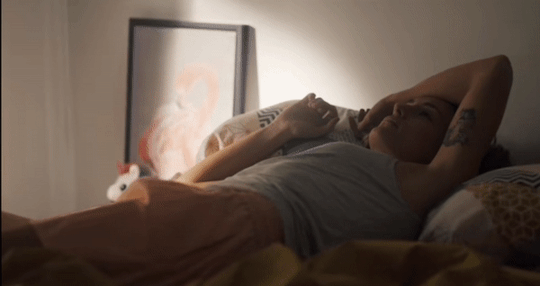
pt. 3 masterlist
Warnings: this story contains depictions of alcoholism, adultery, and familial issues. read at your own discretion. this chapter in specific discusses themes of abuse and alcoholism.
A/N: the long awaited part 2 to ‘ad astra per aspera’! this took a lot of thinking and scrapped passages to really get this on point, i hope you enjoy 🫶🏼
"You’re early today!”
You smiled halfheartedly at Magdalene and Dani’s teacher, nodding at her. “Yeah, uh, I’ve gotta get to work a bit earlier today so…”
“Not a problem, I’ll see you later,” the woman responded. You gave Magdalene and Dani one last hug before returning to your car, having hope that you’d finally be early to training for once and go the day without being berated by Alexia.
You didn’t want to relive the other night’s training, not in your mind, and definitely not in person. With you, Alexia was a completely different person to the patron saint of Barça that everyone painted her as. You wanted to change that and show her you weren’t as irresponsible and careless as she thought you out to be, but you couldn’t.
It was a relief to see the training pitch parking lot barely populated as it came into sight. There was maybe two cars, which meant you were on time. How incredible.
Before every training, a hopeful feeling swelled inside of you — one of happiness, because you saw football as a means of enjoyment and something to look forward to when all else came crashing down in your life. It was short lived of course, but like a phoenix, it always came back one way or another. Were you wrong for believing in your sport to help you?
"(Y/N), you're early.. for once."
You knew that voice all too well. There was a surprised tone that Alexia's voice held as she spoke, and you knew she expected you to show up late once again if not miss practice completely.
"Yeah, surprise," you replied dully, sitting down on the bench to put your boots on.
"Why are you early?" she asked, and it was a bit of a stupid question.
'Well, after you yelled at me in front of everybody the other day, I decided that if I have to drop all three of my siblings off to school, I might as well do it as early as possible so I don't have to worry about getting screamed at and humiliated at half past nine in the morning!'
"Dropped my siblings off earlier today," you mumbled instead, eyes fixated on the ground as you spoke. You were sure that eventually, your fear would be the one to corrupt your family completely, but you couldn't tell Alexia; it was equivalent to opening yourself up to her, being vulnerable even after trying so hard to maintain a tough front.
She glanced at you, her eyebrow just barely raised but her mouth idle. You cinched your laces tightly and sprung to your feet, very aware of her gaze fixed on you as you grabbed a ball from the bag and dribbled it over to the nearest wall, preparing for the training session ahead.
More of the team started to file through the pitch gates. You could hear their bags dropping to the ground as you passed against the wall, and as Mapi passed behind you she squeezed your shoulder. “I’m glad to see you, (Y/N),” she said, a smile on her face.
For once, as training started, you didn’t feel dreadful. You were excited and motivated by the good start to the morning, which showed in the newfound pep in your step and enthusiasm around the pitch.
After a long while, the sun began to set, which indicated the end of training. You sat down at the bench, unlacing your boots and trading them for sandals. Unexpectedly, Alexia sat down beside you, saying, “Good job today. You did well.”
“Graciés,” you responded, standing up while slinging your bag over your shoulder, “See you tomorrow.”
She watched you leave through the gates, her eyes unwavering on your figure disappearing around the corner.
You lived next to a lovely elderly lady named Margalida. She was a sweet woman, always saying bon día and bona tarda to you and your siblings whenever she saw you. Sometimes, after you returned from training and picked up your siblings, she invited you four into her home to share pastries with her. You always accepted, of course, because it was much better than subjecting yourself to the olfactory assault that was your home, and she was also a widow that you figured needed some company from time to time.
When you weren't home, you couldn't monitor your mother's behaviour; praying that it would stay somewhat normal would have to suffice. You didn’t know whether Margalida knew about the true nature of your household or if she thought you were all naturally raucous.
You pulled into the driveway, parking the car as the doors opened and your siblings got out of the car. “(Y/N),” Magdalene said slowly, imploring you to look at her curiously. “Who are those people?” she pointed ahead, and that’s when you noticed Margalida at your doorstep, alongside two police officers and another woman. She looked like a regular office worker, but you weren’t an idiot; she was obviously a social worker, which could only mean one thing. A bad thing.
"You three stay in the car for a bit, okay? I'm gonna go talk to these people," you said to your siblings, motioning to the car as you turned around again and walked towards the people.
You felt nothing but dread in your gut as you approached them. One of the cops, who was talking to a distressed looking Margalida, looked at you and began to speak. "Miss (Y/L/N)?"
You nodded slowly, "Before we talk, can I just send my siblings inside?"
"That won't be possible," the officer said, making you raise an eyebrow, "...Because we're here regarding a call about a person inside, which we now know isn't you."
"I heard yelling from inside," Margalida added. "It was loud, and– and it sounded like there was crashing, from things being thrown around."
She took a deep breath, looking at you sympathetically. "I thought one of you was being hurt, so I called the police."
"I know your situation with the..." she paused, gesturing to the rubbish bin. You spun around, your eyes widening at the sight of it. Cans and bottles galore filled the bin to the brim, threatening to spill out. You could count at least ten, and that was only at the surface of the deep bin. You could recall the rubbish being collected just a few days ago, and now it was basically full.
She looked at you, her eyes pitiful. You hated it, so much; pity made you feel like a kid, and it angered you that the only time you got to relive any sort of childishness was when someone noticed you were suffering, not because you actually had the liberty to behave like one again. Where was the pity when you actually were a kid, having to wake up and stay afloat to support three other kids?
"Who else lives here, other than you and your — I'm assuming — siblings?" the other cop asked.
"My mother. My dad left a few years ago," you mumbled, looking at the ground.
"Is she home right now?" he asked, and you nodded. "Yeah. She's probably asleep, so if you did knock on the door, that's why nobody opened it."
"Asleep or blacked out?" his partner suddenly added. You looked at him, clenching your jaw as you shrugged. "How am I supposed to know? I've been at work all day."
"What do you do for work?"
"I'm a footballer."
"For FC Barcelona?"
"Buy a ticket and maybe you'll find out."
You ended up sitting across from the two officers and the social worker in a dingy, dark room scarcely furnished with only a table, three chairs and a dirty window to accessorise it. This time, the woman did most of the talking while the cops just surveyed the conversation. Magdalene, Dani and Lorenzo were sitting in the waiting room of the station — you didn't want to drag them along, but you didn't have much of a choice.
"Can you tell us a little bit about your family history that might correspond with the things reported to us today?" she asked, leaning across the table.
"My dad left when I was, I think.. 13. Cheated on my mum and left us all for another woman. My mum, uh, got out of control. She didn't take it well," you replied, not looking up once as your gaze was fixed on the chestnut-stained, chipped table.
"I see. Well, from the contents of the rubbish bin, I presume her coping had something to do with alcohol," the woman said. As if her apathy hadn't been obvious from the start, it was dripping off her every word and showing her true intents; not to help you, but to get this over and done with and throw your siblings into foster care, then consider her job done and get paid for it.
You nodded at her claim nonetheless, picking at the paint of the table. "Yeah."
"Have you or your siblings ever been subject to abuse, from either of your parents?" she continued
"No no, absolutely not, they never hit–"
"I'm not just talking about physical abuse, (Y/N)," she interrupted. It was the first time of the entire questioning you had looked up as you met her gaze, your eyes saying more than your mouth ever could.
"It was just a few arguments,” you responded coldly.
“When we asked Margalida, your neighbour, about if there’s been any incidents like this, she said there has been. Yelling, screaming, and lots of it,” the woman told you. “How many arguments are you considering a few, (Y/N)?”
The table shook from the impact of your hand slamming it sharply as you shot to your feet. "If you consider a couple arguments to be verbal abuse, go ahead. My mum is hurt and angry, very angry about her husband leaving her, so yeah, she drinks and we argue about it!"
"Listen, please sit down. I understand that you and your siblings are troubled children but–"
"I hate being a– I hate that term, 'troubled kid', you know? We aren't troubled! If we were troubled, wouldn't we be dead? Wouldn't we be troubled by an inability to continue living in these conditions, these... ruins?"
Silence. You sat down once again, your head in your hands.
"Do you have another location you can stay at?" she asked you. You shook your head, the feeling of dread burying itself deeper in your gut.
"Unfortunately, we will have to place your siblings in foster care. The living conditions are unsafe and unstable for kids their age to be living in," the social worker finished.
You wanted to burst into tears. You wanted to sob and sob and sob, harder than you ever have, but the tears wouldn't summon.
"There is another option," she spoke slowly, making you immediately look up from the darkness your palms shrouded you in.
"...we contact your father and see if he wants to look after them."
It sounded just as bad as placing them into foster care. Now, you wanted to scream in her face and call her utterly stupid for assuming that a man who abandoned his kids would want to take care of them years later to keep them out of the foster system. Why on God's green earth would he want to reap the consequences of his infidelity?
"Are you hard of hearing?" you scoffed. "Yeah, so, I said earlier that he left us years ago for another woman, you know, to make another family. He didn't want us."
"He's the only other option at the moment. Unless your mother can be moved to a rehabilitation center in sufficient enough time, and you become their legal guardians, they will end up with foster families. Possibly not even the same one."
The news weighed on you like bricks. It was all so much, you couldn't think straight and contemplate possible outcomes and solutions. You put your elbows on your table and held your head in your hands once again, taking a deep breath.
"Can I at least find someone myself who's willing to foster? Someone I know?" you asked, your tone being nothing short of desperate.
She took a moment to respond, and it was probably the most nerve-wracking few seconds of your life, until the ultimatum was spoken.
"I suppose, yes. That is basically the whole principle of fostering, so I see no issue. Until then, they will be placed in a temporary home before we start looking for a permanent family. A pair of officers have gone to detain your mother and we'll review the information from this questioning to determine whether she should be charged or put straight into a rehabilitation program."
"Thank you," you almost cried, your body relaxing from the little bit of relief and reassurance you had just received. There was still a possibility that you could get your siblings back.
The problem standing in your way now was, you didn't know anyone willing to foster. You had no idea who you'd turn to, and it actually made you realise that you were pretty alone in this whole ordeal, and life in general. You really did have nobody but yourself, and clearly there came a time where that wouldn't be enough.
"Magda, Dani, Enzo, come on. We're going now," you said as the door of the interrogation room swung open. You beckoned at the kids, who stood up and ran to you, following you out of the door.
You didn't want to go home yet, just in case the officers were still there and you'd arrive to the horrible scene of your drunkard mother getting dragged of her own house by the authorities, so you drove to the training pitch. You were in search of one person in particular, and hoping to avoid another one.
Parking the car in the same spot you had parked in the same morning, you quickly got out of the car and ushered the kids onto the pitch to play for a little bit while you went into the gym.
As soon as you walked through the automatic glass doors, the person you were searching for was stretching on a yoga mat, her resistance bands discarded above her head.
She sat up, looking at you with a mixture of surprise, confusion and concern, probably achieved from your sorrowful expression.
"Vicky, I need your help. Now."
#fc barcelona femeni#fc barcelona#fcb femení#woso#woso community#woso angst#woso imagines#woso x reader#woso fanfics#alexia putellas x reader#alexia x reader#fcb femení x reader#fc barcelona x reader#futfem#ad astra per aspera
489 notes
·
View notes
Text
The Rules of the Twist
Given the themes of deception and sleight of hand in Good Omens season 2, I think most of us agree it's at least possible there's some kind of twist waiting to be revealed in season 3. We're bouncing around a lot of theories, but I wanted to take a step back and look at the general shape of what we might expect.
The big twist we've seen before in Good Omens is Crowley and Aziraphale's body swap. (Okay, technically it was an appearance swap. But that just doesn't sound as pithy.) Rather than anticipate an exact repeat of this trick, I'm considering the swap as a sort of model. What does it tell us about the rules Neil plays by when he pulls a twist in this story? What clues can we expect, and what can we not count on? Sure, there's no guarantee that a season 2 twist is going to map exactly onto what we've seen in the past, but I think it's a reasonable place to start. Take these as guidelines and take them with a grain of salt, but if you're sorting through all our fascinating Good Omens theories and trying to decide what you think, you might find them helpful.
So then, what are the rules?
Broadly speaking, Neil plays fair with twists. He foreshadows and includes enough hints for the audience to make a reasonable guess at what's going on, or at least to look back after the reveal and go, "oh, of course". But he still keeps some cards close to the chest.
During the body swap, there are two big gaps in the information we're given:
Key events happen off screen
The swap happened between scenes, during a time that it was only suggested, not confirmed, that Crowley and Aziraphale would be together. The transition between these scenes also used film and tv conventions to make that passage of time "invisible" - we see Crowley and Aziraphale get on the bus, and then we see them in the morning going about their days separately, and we're conditioned to think nothing important could have happened in between.
Key tools (eg abilities, items, information) haven't been shown before
The swap was not something we'd ever seen Crowley and Aziraphale do, and it wasn't something they'd ever talked about either. It fit comfortably into the established world building but it hadn't been specifically signposted as a possibility.
The other big twist that Good Omens pulled was the romance between Gabriel and Beelzebub as the explanation for Gabriel's disappearance from heaven. Both of these information gaps are involved here too. The offscreen event is obviously the meetings between Gabriel and Beelzebub that lead to them falling in love - up until Gabriel's flashback sequence, the only indication they'd ever met each other was a brief conversation at the airbase during Armageddon. The tool that we haven't seen before is Beelzebub's ability to create a fly vessel for Gabriel's memories (protecting him in much the same way that Crowley and Aziraphale protected each other with their body swap, in fact).
These are pretty big gaps, really. And given that Neil knew there'd be years between seasons 2 and 3, I expect he would have leaned pretty heavily into them if he wanted to hide something. So how do we predict a twist if we can't know where it is and haven't seen what it might involve?
Unanswered questions
This is the big one. Looking at where the furniture isn't, you might say.
What's interesting is that the questions that point to a twist aren't usually subtle or ambiguous. For the body swap, the two converging questions were: what did Agnes' last prophecy mean, and how could Crowley and Aziraphale survive their executions? In season two, some of the unanswered questions signposting Gabriel/Beelzebub were: how did Gabriel lose his memory, why was he carrying a box, what was the significance of the song he kept singing, who was he at the Resurrectionist with...
I think guesses about upcoming twists are most convincing when they seek to tie up loose threads from the show. For this reason, I'm a little skeptical of theories proposing the kiss between Crowley and Aziraphale involved some kind of twist. It isn't impossible, I just don't see any unanswered questions there. (Savvy readers may note that I too have speculated about a twist hidden in the kiss. I do find the possibility fun, but it's not a theory I'm seriously committed to). If I was going to really buy into one of these theories, I'd want it to explain one of my big unanswered questions other than "but how could they get into a fight that hurts me so deep in my soul?" That's definitely a question I have, but not technically a mystery.
It's worth noting that in the case of the body swap, we were initially given a false answer to the question "how did they survive their executions?" The angels and demons watching attribute it to Crowley and Aziraphale having "gone native", believing that their natures had fundamentally changed, making them immune to holy water and hellfire. It might be the case, then, that some of the apparently resolved questions this season warrant further investigation. Is there more to the story of Gabriel's disappearance than we know, for example?
2. Unexplained details
If examining an unanswered question is looking at where the furniture isn't, then this is where we take all the pieces of furniture piled up in storage and see if we've got anything that fits. Everything is fair game here: script, acting, music, props, sets, costumes, editing, camera angles, audio effects, visual effects, everything. If it's on the screen or coming through the speakers, it was put there on purpose by multiple teams of highly skilled and attentive creators all working together to create the final product.
I think you could probably do an entire meta on all the little details pointing towards the season 1 body swap, but here are some of the big ones:
"Crowley" sees the restored Bentley, but takes a taxi instead of driving it
"Aziraphale" circles "Crowley" when they order their ice creams, the way Crowley more typically moves around Aziraphale
"Crowley" says "tickety boo", an extraordinarily Aziraphalean phrase
The collar on "Crowley's" jacket is a beige tartan rather than its usual red
There are general differences in the ways David Tennant and Michael Sheen embody the characters throughout the swap
Similarly, Gabriel and Beelzebub's romance has lots of small details pointing to it. The big one that keeps showing up is the connection between Gabriel and flies. He mentions them and interacts with them repeatedly, and although it isn't obvious at first glance, there's a fly in the box that he carries to the bookshop. This all culminates in the reveal that it's the same fly, Beelzebub's gift to him.
Here's the problem, of course: if everything in the show is intentional and crafted with meticulous attention to detail, how do we know what actually matters? This is why I think it's so important to look at the unanswered questions first. There's a joy in seeking out Easter eggs and connecting all the dots, and sometimes you might strike gold this way, but there's also a lot of noise in the signal. It's helpful to know the general shape of what you're looking for, so you'll know when you've found it.
You can reverse engineer this. Start with details that jump out at you and then look for a puzzle they might explain. This works, but it's a little easier to get lost in the weeds, struggling to sort out what's significant and what's a fun reference to another piece of media or a hint to a question that's already been resolved. Going back to the twists we've already seen on this show, the unanswered questions around them were really big and obvious, so I think it's a good idea to ask: if I hadn't noticed this detail, would I have thought this was a mystery that needed solving?
Okay, but what do we do with this?
Well, maybe nothing. These criteria can't confirm or rule out any theories, after all. I'm laying it out like a rubric but it isn't really, I'm just describing a few storytelling patterns we've seen before and making some rough guesses about how they might show up again. If I were really serious about this I'd probably take a look at other examples of Neil's work and see how well my model holds up there, but the truth is I'm not really familiar with enough of his other works to do this. (Confession time: I was always more of a Pratchett fan).
The main reason that I've laid everything out like this is it informs my thinking when I stress test my own theories, and I figured other people might be interested in it. I'm also hoping it will help me to be able to refer back to this when I write meta in the future. For my own purposes, I find a breakdown like this helpful because it gives me a sense of how a writer approaches their story, where they'll tip their hand and where they'll hold things close. It's no guarantee and it wouldn't be any fun if it was, but in a lot of cases we're not aware of our own patterns, so it can be surprisingly illuminating.
496 notes
·
View notes
Note
Hey! I was just wondering if you have any ideas of how I can display the fact that a character has aged (not necessarily from adult to elder but just in general) without describing appearance. I’ve tried searching it up but they never really want into detail or they simply advised on changing the character slightly as in giving them old fashioned hobbies. I’m sorry if this has already been answered or does not simply have a direct way and must be decided by the author. Again I am very sorry if this has already been asked I really don’t mind if you either direct me to the answer or copy and paste it if so :)
Showing a Character Has Aged
When it comes to illustrating that someone has aged, you basically have four choices: describe physical characteristics that illustrate age, describe physical activities that illustrate age, indicate the passage of time, flat-out state that the character has aged.
The problem is that aging isn't a wildly specific thing. People don't take on certain physical characteristics, appearance, or activities at exactly the same age. While there are certainly some activities and behaviors that are broadly specific to age categories, age is not accurately defined by behavior, thought process, personality, etc.
If I say, "The last time I'd seen my nephew he was barely crawling, and now he was not just walking, but climbing on everything..." that's a pretty good indicator that this child has aged. But how much? Because babies don't all learn to crawl at the exact same age, or learn to walk at the exact same age for that matter. Some babies skip crawling and go straight to walking. Other babies seem like they'll never go from crawling to walking and suddenly do. This child could be two weeks older than last time or two years older. It isn't clear at all.
Complicating things is the fact that physical appearance is also not a good indicator of age. I mean... as I've pointed out in the past, Paul. Rudd:
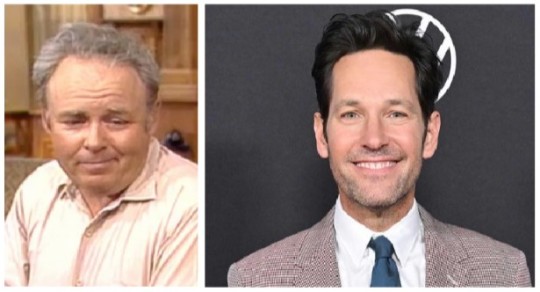
Carrol O'Connor (on the left) is the same age in that photo as Paul Rudd is in the photo on the right (both are early 50s here). And while things like hairstyle and fashion do have an impact on how we view someone's age, some people just get wrinkles/gray hair/gain weight/lose muscle tone sooner or later than others.
And, the advice to "give them old-fashioned hobbies" is terrible. "Old-fashioned hobbies"? What, like candle-making and churning butter? What does that even mean? Maybe these people view hobbies like knitting, stamp collecting, and wood-working as "old-fashioned," but I guarantee those are hobbies that are broadly enjoyed by young people to this day.
If I write, "She sat on the couch lovingly knitting a sweater," that tells me nothing about her actual age because:

And, again, the woman on the left could be sixteen or thirty-five, and the woman on the right could be sixty-two or eighty-six.
So, outside of flat out stating that a character has aged, your best bet is to use a combination of these methods to get the point across...
"It had been over ten years since I last saw Mr. Smith. At the time, he'd recently returned from hiking in the Alps. Now he was hunched over a walker, his formerly salt-and-pepper hair now stark white. The deep grooves that had once made his face look handsome and worldly now made him look wizened and tired."
Between stating the amount of time that has passed (over ten years), physical activities (hunched over a walker vs hiking in the alps), and physical appearance (white hair and tired wrinkles vs salt-and-pepper hair and handsome lines), it is very clear that Mr. Smith has aged quite a bit in the decade since the POV character last saw them.
I hope that helps!
•••••••••••••••••••••••••••••••••
I’ve been writing seriously for over 30 years and love to share what I’ve learned. Have a writing question? My inbox is always open!
LEARN MORE about WQA
SEE MY ask policies
VISIT MY Master List of Top Posts
COFFEE & FEEDBACK COMMISSIONS ko-fi.com/wqa
90 notes
·
View notes
Text
An unnecessarily long ramble about Shirase's role in Storm Bringer - Part 1
Storm Bringer's Themes and Shirase
At it's core, Storm Bringer is about the many ways someone can be dehumanized and also the many ways a person can exhibit humanity without necessarily being 'human'. Nearly every major character within this book showcases these themes from Chuuya to Adam, to Verlaine, to Dazai.
And yes, even Shirase, however I think the way these themes affect Shirase's character is overlooked a bit, because compared to everyone else, he's ordinary and often times being annoying. The dehumanization he experiences isn't some Big Bad, but that doesn't mean it's not there. The way he regains his humanity is with an internal struggle. It's not as exciting as everything else, so it's no wonder it doesn't get talked about as much.
However, I'm obsessed with it, so I'm going to talk about.
The Dehumanization of Shirase
'The young man would then rivet, wipe, and remove its burrs. Then another part would come his way. Rivet, wipe, file. Rivet, wipe, file. Rivet, wipe, file. Rivet, wipe, file.
He would do that as many times as it took until he eventually thought, I've had enough of this. After finishing the next metal part, he was going to quit and go home. He had that same thought every single time he worked until the bell eventually rang, letting all the workers know that their shift was going to end in five minutes. Only during those five minutes did the young man feel some what human.'
This is how we are introduced to Shirase and for me it's one of the grimmest passages in the book. There are certainly events that are more horrifying, but this is grim in such a mundane way, and its because this is how a lot of people spend their lives. This is the type of dehumanization real people can easily relate to.
Working day after day, hour after hour as a cog in a machine, loosing everything you are to your job that you hate until the end of the day where you can regain your sense of self.
Asagiri will often not use a character's name at the start of chapter to create some mystery as to who they are, specifically he does this a lot for Dazai. However it's still interesting me that in this whole passage, it's not until the last paragraph that Shirase is named. By Chuuya. Until then, he's nobody, just a faceless worker, only becoming a person once he's relevant to the plot.
In this passage it's also noted that some of the other workers try to invite Shirase to eat together, but Shirase declines. They are all older than him, it doesn't mention any names and there's no indication that Shirase considers them his friends. Why would he? This is a place were he doesn't even feel like himself, how could he possibly form friendships?
The most interesting way, to me, that Shirase is dehumanized throughout Storm Bringer is the way several characters treat Shirase as insignificant or as someone to be used/disposed of, despite those characters being ones who we root for.
The Port Mafia treats him as a hostage, all his friends had been shipped away to different parts of Japan. He has no support network anymore, he's alone. He lives with the knowledge at any moment the Port Mafia could decide to kill him.
Murase, despite caring for Chuuya and 'wanting to show him the light' does not extend that same kindness to Shirase. He uses Shirase as a means to get Chuuya to come to the police station. Murase even bullies Shirase whilst arresting him.
'Nobody cares about small fries like you, so you've got nothing to worry about.'
It's an off-handed comment and probably to be funny and out of the context of the dehumanization theme it is. But everyone in this story is telling Shirase the exact same thing. He's worthless. Shirase isn't worth Murase's time, he isn't worth saving. Whilst Murase talks to Chuuya about living in the light, he has Shirase locked away in a dark cell left to rot. Because Shirase isn't important.
Murase sets it up so Shirase's freedom is dependant on Chuuya's choice. If Chuuya agrees to be an informant, Shirase will be let go. He doesn't give Shirase the chance to fight for his own freedom because he has nothing Murase wants.
It might be annoying the amount of times Shirase claims he's 'the king' but when everyone else treats him like nothing, it's not surprising to me that he's so desperate to be recognized.
Adam, is perhaps the worst offender of this. He does not like Shirase and whilst I'm not saying he has to, he is also our main narrator through out the book. He interacts with Shirase the most. He also thinks Shirase lacks intelligence and is an annoyance. Despite being programmed to save humans, he treats protecting Shirase as a chore, even though, Shirase is the exact type of person he was meant to protect. An ordinary one.
When Verlaine attacks Shirase in the cells, Adam gives up and accepts Shirase's fate despite saying several times how terrified he is.
'Shirase's voice trembled with fear.'
'Shirase's voice quavered like never before. It took everything he had to simply stand on his own two feet.'
'He was too astonished and afraid to even to even yell out.'
'The worst thing that could happen right now would be losing Master Chuuya or me and being unable to follow with our plan to ambush Verlaine. He had two more targets remaining. There was still hope.'
He's as good as sentencing Shirase to death here because his life isn't as important as Chuuya's or his own. Shirase is disposable. Adam says as much when trying to convince Shirase to come with them. It's made all the more heartbreaking when Shirase is looking to Adam for help but Adam has ready decided he can't do anything.
He says that there was no chance of success at saving Shirase but as soon as Chuuya is in danger, Adam is able to break free from the wall he's trapped in. The possible outcomes don't matter anymore, Chuuya is in danger and he has to try and save him. Something he wasn't willing to do for Shirase.
After Shirase falls unconscious from being poisoned Adam leaves him locked in a storeroom and says he should be safe there. Despite the alarm system broadcasting that everything within the building is going to burned and everyone needs to evacuate. Implying anyone left behind will also burn. When Shirase wakes up alone, thinking he's been abandoned, he easily gets out of the storeroom, meaning anyone could have just as easily got in and killed him.
'The poison was probably meant for Master Chuuya while Shirase was merely collateral damage.'
This what Adam says about Shirase being poisoned and I can't tell if it's supposed to Adam saying how the military sees Shirase or how Adam feels about him. Because it's exactly how he treats him.
The dehumanizing way Adam treats Shirase affects how the reader views him too. Readers are already inclined to dislike Shirase after the events in Fifteen, now in Storm Bringer we spend most of our time with a narrator that also doesn't like Shirase. So when Adam exhibits a lack of care towards Shirase, calls him dumb, annoying and dismisses him, the reader is easily led into doing the same.
And it's sad because Shirase is genuinely scared and struggling throughout the story. But we almost only ever see this during the few parts that are narrated from Shirase's perspective.
Which I will talk more about in Part 2 when I discuss Shirase's overall arc and the ways in which he regains his 'humanity'.
If you read all of this, then thank you :D I hope you enjoyed
Disclaimer: This is not hate on Adam's character, I love him, however this post is about Shirase not him.
27 notes
·
View notes
Text
Henry And Norman's Canonical [and unexplored] Friendship and why it needs more focus in canon and fanon
An essay by me~
So I've talked a lot either in tags or in other posts about Henry and Norman's implied friendship in the canon of Bendy, however implied isn't really the right word, unexplored is more accurate because despite the fact we've never seen them interact, Henry and Norman having been friends is entirely canon with a lot of proof for it!
Don't believe me? Well let me show you why I am obsessed with this duo~
So first we're starting with the games since they are the ones most barren for this implication. We only really have one line in BATIM to go off of in terms of this, but they are interesting and important ones. Specifically we have one line from alice and an achievement to look at. [EDIT: I forgot a note written by Henry! I have added it now below]

Just from Alice's line we know she was under the impression Henry and Norman were friends, which not only shows they were in fact friends but close enough that others knew they were friends. Combined with the theory that Alice created the projectionist [one that is slightly backed up by BATDR confirming she was the one who mutilated the butcher gang] her teasing tone here could be rubbing in the fact such a horrible fate fell on someone Henry was close to...
It's an idea I think fits really well with Joey having created the cycle specifically to torment Henry too, why not make his friend one of the most mindless and horrible monsters down there just to make him feel worse. So close yet so far from one of the friendliest friends he knew.

The other thing I want to draw attention to is the Norman's Fate achievement, this is the Only time the projectionist is referred to as Norman and it comes from Henry's POV. It's a bit of stretch but I think it could be Henry refusing to dehumanize Norman by calling him the projectionist instead calling him by his name. A detail I think is very cute and could show Henry's sympathy towards his friend's suffering... and fate.
EDIT:
However we have another great indicator on how Henry feels towards the projectionist in particular and that's this note left by him on level 14.
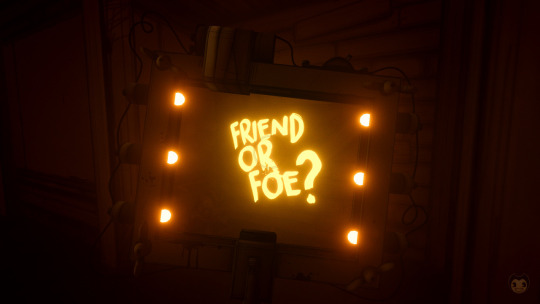
Level 14 is the Projectionist's level, one full of the corpses of his victims and where he hunts Henry relentlessly, but Henry still questions The Projectionist being nothing more than an enemy. Their friendship seems to have meant a lot to him, and it seems to be on his mind, even after seeing what Norman has been twisted into. This could also be because the Projectionist literally fights the ink demon too. Who is far more antagonistic to Henry. Either way, I find it very sad but also a nice way of subtly touching on what Henry and Norman's friendship means for how Henry thinks of the Projectionist.
This is also a bit of a stretch but when Norman/The Projectionist peeks into the miracle station Henry is hiding in, in chapter 4, he doesn't seem super threatening, just curious and it even somewhat emulates Sammy's motions when commenting on Henry's familar face. Was there a moment of clarity for Norman there? Seeing his old friend hiding in there? Maybe, it's a little too vague to really dwelve on here but it is something to think about...
But time for us to get into the meat of their relationship, with the books, the media that elaborates far more on Henry and Norman's characters and has the lines from Norman confirming their friendship.
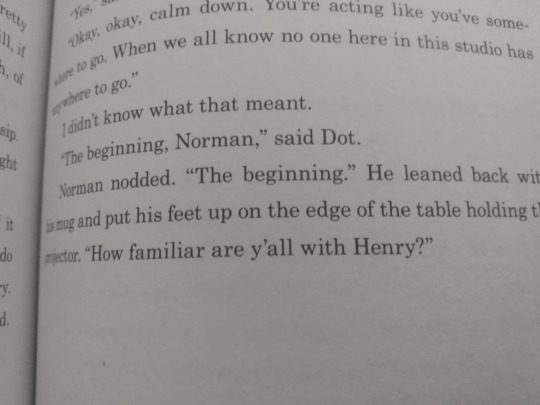
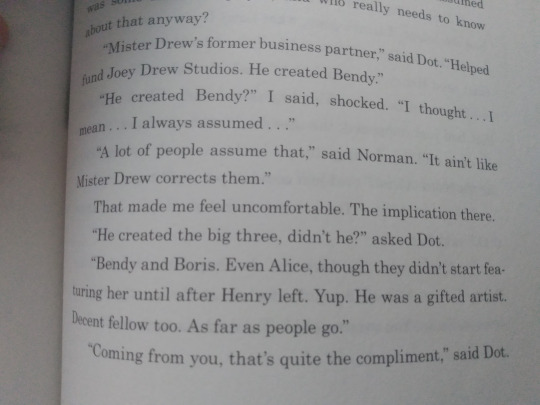
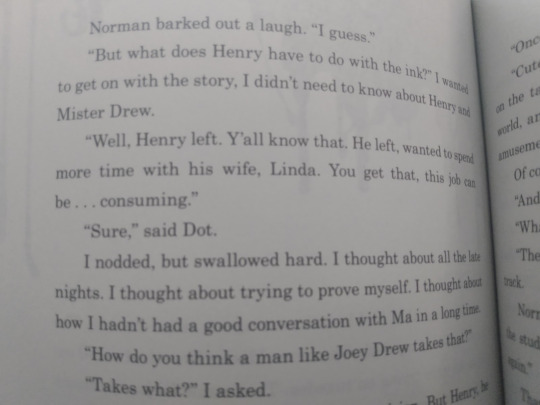
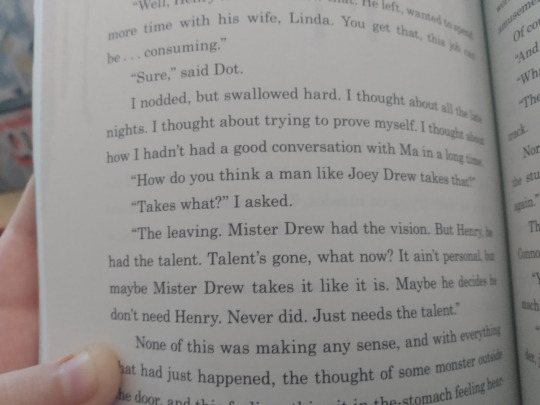
I absolutely LOVE these passages they show off so much more about Norman's character and expand on the idea he and Henry were friends in such a nice way. Norman talks about Henry in a way so unusually positive for him Dot feels the need to point out how much of a compliment it is for him to say he's a decent fellow with a lot of talent. He also speaks with a lot of sympathy towards Henry's blight and the abuse Joey made him endure, doing this all with his feet on the table holding up a projector, a smile on his face and a mug in his hand. He speaks somewhat vaguely and with mystery not exactly with Sammy's theatrics but with his own ominious air.
He also recognizes Henry leaving wasn't personal and that Joey likely held a grudge over it, plus when Dot comments on how odd it is for Norman to speak of someone like this, he doesn't refute it, just agrees with a laugh.
These passages are one of the reasons I think the books are some of the best media to come out of the series and I hope soon others realize what untapped potentional the books hide.
But...
Sadly despite all these interesting implications there's not a lot of canon or fandom content showing Norman and Henry's relationship and even less that attempts to develop and explore it. But for me it's one of the most interesting relationship's we have in BATIM [a series that is rather lacking in implied friendships or relationships between its characters]
Hell Henry's wiki page even mentions their friendship but Norman's page does not, which is strange since he has the most to speak on their friendship in the books. At least it's strange to me

So why is this relationship so fascinating to me? Just because of the dynamic it presents to us and its potentional for fun interactions!
Norman is portrayed constantly as a strange mysterious and almost intimidating figure, he sees everything, he goes to investigate strange noises under his booth with nothing but a light to find out whats making a horrid noise at night, and when Buddy [a 17 year old delivery boy] shows up at the studio and asks where Joey is Norman tells him he's DEAD. Which Buddy can only pick up on as a joke when someone else comes in to tell him Norman's sense of humor is strange, all while Norman bursts into chuckles. He's also pretty easy going esp in comparision to Sammy's dramatic nature.
Henry however is such an every man, a soft spoken and hard working animator who just wanted to have a better relationship with his work and wife. He's always so calm and just a usual guy. How did he come to form a friendship with such a strange and bizzare guy? Did he enjoy Norman's strange sense of humor? What were their interactions like?
There's so many interesting things to do with such a dynamic and that's not even getting into the tragedy of the Projectionist and Norman's fate. I want to see Henry heartbroken by his close friend's fate and death, I want to see more stuff exploring interactions between the Projectionist and the artist.
Whether it's canon or fanon that does it, I want to see more content on Henry and Norman's relationship. Romantic or not, I just want to see more people talk about it! Because it's one of the most interesting relationships in a series that tends to lack a lot of character relationship drama, pushing for more content of these two might be the bridge towards getting more content from canon that generally shows us how these characters all feel about each other.
Something I don't think is an impossible idea too since Meatly straight up asked us what characters we wanted to see interact, showing interest in these two could be a big W for us I'm just sayin [yes that is me down there]
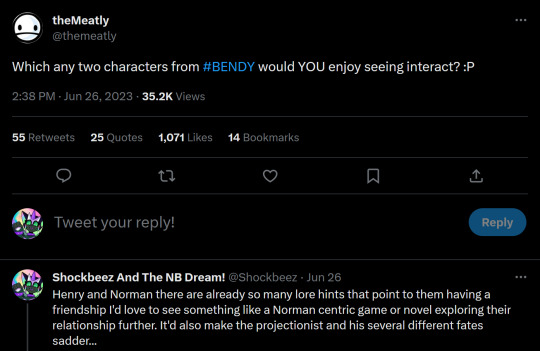
I know I am very biased as a big Norman and Normry/Moving Pictures/Heman fan but I hope this post could show just a few more people the potential of this duo and we get more content of them in the future. Esp since fans have done a lot more with pairings in this franchise with far less content or implications of friendship.
Fingers crossed for a Norman novel where we can see them interact!!
And more content of these two in general <3
#batim#bendy and the dark revival#bendy and the ink machine#bendy#batdr#norman polk#the projectionist#henry stein#normry#heman#moving pictures#like I said not purely shipping here#but i wouldnt mind if this fuels more shipping of them in the fandom >w>#either way hope people read this and hope people like this#I always love making little essays on my passions and this is a topic I absolutely love#these two live in my brain SO much#and now I hope they live in the brains of others too <3#ramblez
91 notes
·
View notes
Text
Peter Pettigrew is intelligent.
I previously wrote a meta about how emotionally manipulative Peter was in the Shrieking Shack scene.
And I want to further my point about him being far more intelligent than the narrative gives him credit for, using lines from the opening chapter of GoF (the Riddle House).
In this chapter he advises Voldemort, against going after Harry's blood for his resurrection magic.
“My Lord, I do not say this out of concern for the boy!” said Wormtail, his voice rising squeakily. “The boy is nothing to me, nothing at all! It is merely that if we were to use another witch or wizard — any wizard — the thing could be done so much more quickly! If you allowed me to leave you for a short while — you know that I can disguise myself most effectively — I could be back here in as little as two days with a suitable person — ”
In this quote, he is showing that he's capable of strategic thinking and even has confidence in his ability to be cunning. His advice is actually very sound, especially given that Harry escapes and alerts Dumbledore about Voldy's resurrection. Peter even pushes the point;
“My Lord, it makes sense,” said Wormtail, sounding thoroughly relieved now. “Laying hands on Harry Potter would be so difficult, he is so well protected — ”
And later on in the passage, he actually pushes back against Voldemort one more time:
“My Lord, I must speak!” said Wormtail, panic in his voice now. “All through our journey I have gone over the plan in my head — My Lord, Bertha Jorkins’s disappearance will not go unnoticed for long, and if we proceed, if I murder — ”
Gone over the plan in my head- indicates that he does really mull things over. And he even gets annoyed about how much his intelligence is overlooked:
“I found you,” said Wormtail, and there was definitely a sulky edge to his voice now. “I was the one who found you. I brought you Bertha Jorkins.”
In conclusion, Peter is a good strategist and while he is self serving and disloyal, he's not an idiot.
119 notes
·
View notes
Text
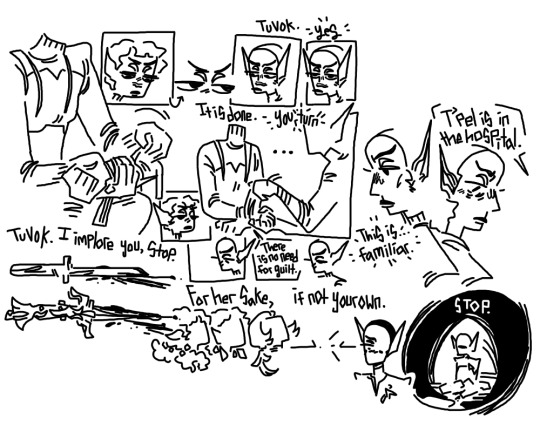
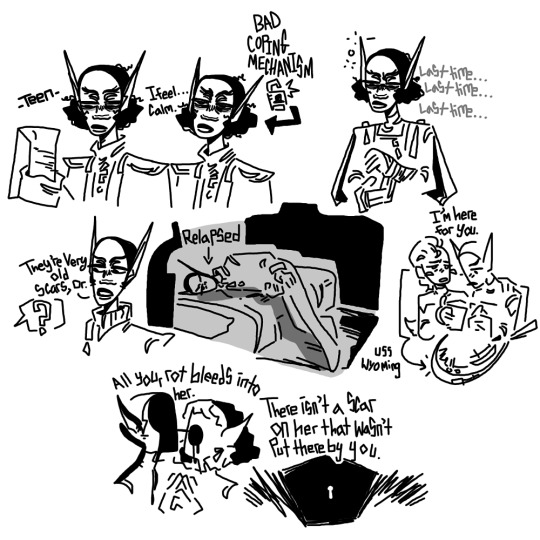
Read a fic about Tuvok having a history of self harm. It's a very short fic but it really interested me! So I wanted to doodle some stuff based on it - the first page is my interpretation of a certain summarized scene:

The concept of Tuvok's own self harm effecting T'Pel so viscerally was what got my attention most of all (as you can see) - I can imagine how much guilt that must have put on him and it's another, alien, dimension to struggling with mental health and one that would be interesting in Tuvok's position where he's now for the first time completely disconnected from his family and only has to contend with himself and his own mind. Once again, Vulcan identity is so fascinating!!! I love seeing what people do with it!
Page One: T'Pel bandages Tuvok's wrists in silence. She looks up at the man himself who's also watching the process. "It is done," she says. He does not seem to have heard her. "Tuvok," she prompts. He looks up. Speaking telepathically, he says "Yes. Your 'turn'." with some bitterness. He begins to bandage her wrists as she watches him. "There is no need for guilt," she says. Tuvok states "This is...familiar." We see a younger Tuvok; He is a teenager who appears disheveled and disturbed by the news he is receiving. An unseen individual, perhaps a guardian, says to him: "T'Pel is in the hospital." We see two knives, showing the passage of time. One is a common kitchen knife while the other is a ritual blade - they are both bloody. The guardian's words continue: "Tuvok. I implore you, stop." We see several women without defining facial features. They are both specific and representative - T'Pel and Janeway are clear and represent 'wife & friends' while the other Vulcan figure is perhaps 'family' (she could be Tuvok's mother, daughter, etc). "If not for her sake..." the unseen voice continues. "Then for your own." At that we see Tuvok appearing disturbed once again, however time has advanced. He is now aboard Voyager and lines emanating from him indicate that his bond to those previous figures has just been broken. For who's 'sake' does he have to preserve himself now? We see Tuvok alone in a severely darkened room - there appears to be a cushion in front of him. Is it for meditation or for a blade to sit upon? He appears to be bleeding. The word 'Stop' is in bold, hanging over him. It is unclear whether this is something he is thinking or the true end of his guardian's plea.
Page Two has several unconnected Images.
One: Tuvok is an incredibly disheveled looking teenager wearing an outfit indicating he is currently residing in the temple he was banished to at that time. He is looking down at his scarred wrist with an impassive yet very tired expression. He looks up, thinking "I feel...calm." An arrow pointing to him informs us that he has just unlocked a bad coping mechanism. Ostensibly as a 'quick fix' to the distress he was feeling at that time.
Two: Tuvok is the same age but time has advanced a bit, indicated by his change in clothes. He is bandaging his wrists, looking as disheveled as ever. His 'quick fix' doesn't seem to have improved his health. He repeats mentally that this is the 'last time' - it can be assumed that he is referring to self harming.
Three: Tuvok is an ensign under captain Sulu. This is his first stint in Starfleet. He is asked a question by a doctor, indicated by a question mark. "They're very old scars, doctor." Tuvok replies dismissively.
Four: Tuvok is the same age but time has advanced a bit. He is lying on his bed in uniform, staring out at nothing in particular. The room is darkened and drenched in shadow. There is the indication of blood. An arrow looming over him states that he has relapsed.
Five: A young Kathryn Janeway offers Tuvok a cup of what might be tea. "I'm here for you," she says, with a very concerned expression. Tuvok does not look at her. He sits with his steepled hands in his lap, staring down. He remains expressionless. There is a doodle of a ship identified as the USS Wyoming to orient us in time.
Six: Tuvok and T'Pel hold hands and stare into what would be one another's eyes. Their facial features have been wiped clean. Tuvok's face is almost fully encased in an amorphous darkness which stretches across the space between them and leaks out of a hole in the middle of T'Pel's face which is being 'filled' by said darkness. The text above reads "All your rot bleeds into her."
The darkness no longer has humanoid shape - there is a small white figure in its midst. It is unclear whether the darkness is emanating from the figure or threatening to swallow them. The text above reads "There isn't a scar on her that wasn't put there by you."
#self harm#self harm scars#ask to tag#doodle page#st voy#Tuvok/T'Pel#Tuvok#comix page#image descriptions under the cut!#fanart#st voyager#star trek voyager
25 notes
·
View notes
Note
The girl’s have doubts. About themselves, whether they are deserving of what they have, but the biggest doubt they have is that if their father would be proud of them. They know hardly anything of him, zestial and Lucifer have given small bits and pieces but not enough to truly put down the doubt of whether he would be proud of them.
Carmilla tries to reassure her girls that yes, their papa would be so proud of his girls, and he would loved to see them grow into strong and independent women.
Throughout Clara and Odette's childhood, the topic of their father had been a sore subject for Carmilla. Carno had been killed by Adam in an Extermination when Odette was 4, and Carmilla had never really gotten over her grief. She doesn't like to talk about him at the best of times, and at the worst, she might break down or become angry at the slightest mention of the word "Daddy."
The elder Carmine daughter barely remembers him as it is. Clara knows better than to ask Carmilla, so she tries to ask her older sister about him sometimes, because she was only 2 when he'd passed -- Clara doesn't remember him at all. Odette wishes she could be more helpful, but her memories of him are fuzzy, and contradictory, sometimes. Everything is piecemeal.
Odette can recall that sometimes he was angry, and the entire house would shake from his outbursts. Other times, he was warm and comforting, and Odette would feel protected in his arms...or snuggled into his fur...depending on what form he chose to take. That would change by the day. He could be very large; gigantic, even...or not-so-large, a normal amount of a man. The main thing was, Odette had never felt in danger from him. Even when he was more a monster than a person, he was still always just Daddy.
She wishes she could remember his face. His real face, not the twisted, changing visage that he'd have to wrangle under control all the time. After 5 minutes with Odette, he'd be more composed, or almost calm. Odette remembers that about him, at least. Stories from Zestial and Lucifer indicate that he'd been violent. He'd never been that way with her or Clara. Or Carmilla, that she could remember. She'd always seen the best side of him, no matter what other people's stories might insist otherwise.
One day, Odette finds his portrait in the attic; she hadn't been looking for it, just stumbled upon it after looking for family photos that Sera had wanted to see. She shows it to Clara, who stupidly goes to Carmilla with more questions. Initially, Carmilla is angry. But Clara is done with all the mysteries, she says. Odette hasn't seen her this furious in a long time
"It's not fair!" Clara screams. "Odette has memories, and I only have stories! He was my dad, too! There's a hole in my heart -- a hole that wants to be filled! I just want to know if he'd be proud of me!"
That catches Carmilla off guard. She looks like she wants to protest again, or scream into the void, but rather than lash out, the matriarch almost immediately deflates. She has no fight left in her at this point. The secrets she's hidden all these years have been exposed, clawed nasty and raw by grief, heartache, and the passage of time. She breathes shallowly for several seconds, trying to think of what to say.
Eventually, she can do nothing except sob, pulling her girls into her chest, holding them close. She keeps them there, for several seconds, before pulling back that curtain, once and for all.
"He loved you girls so much," Carmilla sobs, holding their faces into her chest. "Every day he'd tell me what strong, perfect little angels you were. He wanted to watch you grow into the young women you've become. He'd be so proud of you."
Pulling away, she looks them in the eye, tears streaming down her cheeks. "But he gave his life for you, for me...so you'd have that chance. That's why I ask so much of you -- I'm sorry if you feel like I've been keeping him all to myself, or asking you to be too brave. That was my job, my burden to carry, not yours. It just...hurts. Without him, I had to be strong enough for the both of us. Can you ever forgive me?"
"Why are you even asking that, Mom?" Clara sobs, burying her face back into Carmilla's shirt. "There’s nothing to forgive."
"Thank you," Odette pipes up, in agreement with her sister. "He's more than just a memory, Mom. I know you were just trying to protect us. But that's not your burden to carry alone, anymore."
The Carmine women continue embracing for several moments, wrapped up in so much love, remembering a man who gave his life for them, so they can be together. When the rest of Hell only tries to convince them that he'd been a monster, they know better. Even if they're the only ones who believe it, who remember the truth, they know, and that's enough.
I decided to stick with Carno Carmine, to be consistent with the alliteration in Carmilla’s name, and because it sounds rad.
#hazbin hotel#carmilla carmine#odette hazbin hotel#clara hazbin hotel#sera hazbin hotel#daddy carmine#carno carmine#fan character carno#ask#anon#fan theories#storymapping#fanfic ideas
16 notes
·
View notes
Text
The Virtues of Amsterdam
On the topic of John and Brian's relationship and the buildup to the Barcelona trip, a passage from the book The Rocking City: The Explosive Birth of the Beatles was brought to my attention, which I found interesting so I wanna post it here and talk a bit about it.
Background: Sam Leach was a promoter in the early 60s, and put on many shows for the Beatles, whom he met after they returned from their first Hamburg residence. In 1999 he published a book chronicling his connection with the band.
The author situates the following passage, found on p. 159 here, in early 1962, after an evening of pub crawling with Sam, John, Paul (who by this point has gone home), and Brian.
Brian was doing the driving that night, so didn't have too much to drink. About four in the morning, he dropped me at my house and I invited him and John in for a coffee. The Beatles had no bookings that weekend and as we sat around the kitchen table, Brian was trying to persuade John to go with him on a short break to Amstendam.
In those days, few of us knew much about homosexuality and I thought it was a good idea for John to go. 'The break will do you good, John, I said, casually, to which he gave me a short, sharp kick to the shins under the table. Looking at his bleary eyes, I figured he was well tanked up and ignored him.
Brian continued to extol the virtues of Amsterdan and again I said John should go and enjoy himself. This time his kick drew blood and I glared at him angrily. At that moment, Brian excused himself and went to use the toilet. Once he was out of the room, I reached across the table and grabbed John by the collar, hissing, 'What are you playing at?'
He doubled up with laughter and gasped. 'You bloody fool! Can't you see he's after me?'
If anyone ever had a blank expression on their face, I did then. My befuddled brain struggled to grasp his meaning. Well, it was
1962! Nevertheless, I nodded sagely. 'Oh… I see.'
When Brian returned, I got John out of the situation by reminding him of a forthcoming party. 'I was forgetting Rory's getting engaged on Saturday. We're all invited, so I'm afraid Amsterdam is out.'
Lennon's reply didn't help. 'Is Rory getting engaged again?'
Clearly disappointed, Brian dropped the subject.
At Rory's 'engagement' party, I collared John and asked him what he'd meant by Brian being 'after him'. Hooting with laughter, Lennon told the gathering what had happened and everyone had a good laugh at my expense.
The next time I took my Tower publicity material to NEMS, it was an embarrassed Brian who asked if John had said anything about him.
His relief was obvious when I lied. No. Why should he?'
My anon was implying that the above passage demonstrates Brian putting pressure on John early on in their relationship, when the power was more tipped in Brian's favour.
While I agree that before securing a recording contract John's position was more precarious and Brian was arguably the more powerful one out of the two (though John was already enjoying a decent amount of local fame by this point), I feel this passage actually shows that*, even when John was in an objectively less powerful position than the one he was in by April 1963, he seemingly had no qualms ignoring Brian's invitation, since he never did accompany him to Amsterdam. This would indicate that when he accepted a similar invitation a year later, it was not because he felt it would be career-ending to turn Brian down.
Now, does that mean John definitely went to Barcelona because he was nothing but enthusiastic about the prospect of alone time with Brian? Not necessarily! The account he provided Pete Shotton about his sexual encounter with Brian might suggest that John was more relenting to Brian's apparently endless advances, rather than eagerly consenting ("Eppy just kept on and on at me."). Of course, both Pete in his book and John within this anecdote have an incentive to play down any genuine interest John may have had, but there's certainly a plausible version of events here where maybe Brian does not take no for an answer and spends possibly over a year propositioning John until he finally acquiesces. While this scenario certainly doesn't put Brian in the most flattering light, it's very different from the idea that Brian directly harnessed his position as John's manager to coerce him into sex.
Personally, I'd say the above passage from Leach's book makes it seem like John found all of this mostly amusing, at least by this point in time. It could definitely have eventually stopped being fun to him, but I also think it's very possible that John was consistently giving Brian mixed signals and perhaps quite deliberately keeping him hanging.
*I'm taking the passage from Leach's book at face value here, but I think it would be fair to question whether the author was (perhaps entirely subconsciously!) informed by the Barcelona story and misremembered some details here. I do think this is based on a real memory, but it should never be forgotten that a lot of Beatle anecdotes have been heavily influenced by narratives.
11 notes
·
View notes
Text
Hearts....of ElMax

Certain aspects I already covered again and again in previous posts:
The text from "Lucas on the Line" perfectly describes what happened there even though it is at best secondary canon.
The rest speaks for itself. The revival scene was changed (or certain aspects differ from the script maybe to confuse both the actors & the potential reader, maybe for other reasons. Like it's describing a different "loop" or version. But the script gives us clues) but parts were adapted nonetheless for example the "heart" via a blood stain on El's shirt in shape of a heart. The rainbow isn't directly in the revival but they used something else instead: the spin.
I want to point the out the sounds used in the bottle scene (Givehimthemedicine postet about this, link down below) - when the bottle starts spinning (! Which is important bc ElMax always spins, probably a reference towards Quantum entanglement & time due to the use & clue of the Planck constant by Max Planck in S3 - a spin, loop or spiral.) a heartbeat sound file is used, gradually synced with the beeping of Max's heart monitor: They are syncing their hearts.
Instead of a pure description, here's the clip. I advise using headphones to hear it.
In the rainbow sequence (before the zooming effect around El's head) that glowing light at the center also resembles a heart...
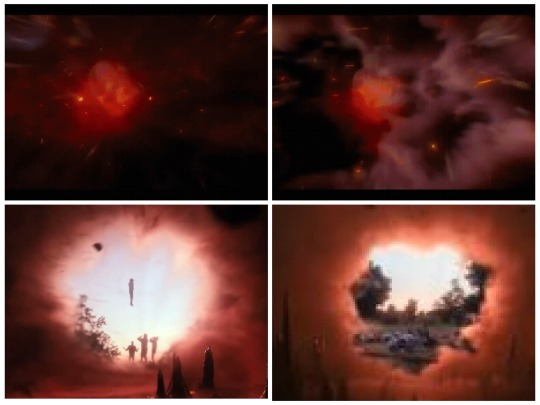
...and the exit of the mind lair takes the form of a heart too.
"That's what holds this party together. Heart.... Without heart we'd all fall apart."-Will
And Max is at its center. She therefore is literally the heart of the party which is then confirmed by the text passage from Lucas on the Line describing the exact same scene. So, whose heart holds this party together? Is there more than one person potentially meant?
Hearts are also part of the conversation between El and Mike. She mentions Max and Mike is confused. Note that El is wearing Max's green scrunchie (and has Will's bear between herself and Mike - remember Hopper pointing something out between Mike & El?). So by proxy Max is figuratively on El's mind in this moment. Look at her fingers too when she reaches to his face and says she'd love him - she touches Billy's face more gently. Mike's face also looks more stunned, not disgusted, confused like....what if El subconsciously kissed someone else? Someone who is on her mind (=green scrunchie). End Mike probably felt that he wasn't meant which is why he looks befuddled and El's reaction seems genuine. Most of our actions in real life are influenced by our subconscious. And Stranger Things quite literally uses the subconscious for example when memories of El overlay and replace memories of Lucas for Max. That's her subconscious speaking.

Like when Mike says those words, El looks over too... Max? As if this line is there to indicate that her life started with... Max. "Are you real? Did I make you?" (Birth imagery, like El "born" out of a cat's paw, or memories of birth do appear in the show every now and then and at this moment, the dialogs and visuals indicate nothing like a normal birth or origin of El. An angel in disguise.)
But back to hearts:
Both hearts, of El and Max, stopped on the same day because of the same enemy. El and Max mirror these events too. And not by accident.
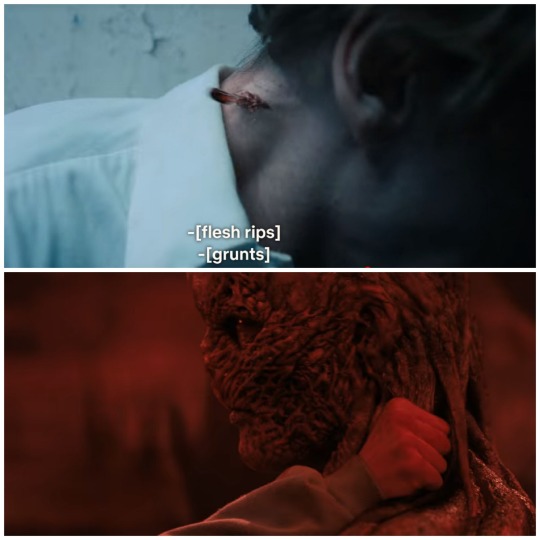
Both revived due to what exactly?...an electric shock? Aka 1.21 Gigawatts? Do El's telekinetic powers work similar to this, like a defibrillator and it's not just moving objects or is it a side effect? (In Season 4 El interacts with Max's physical representation in the Void btw - the electric shock is referenced by the 88mph which appear twice by proxy in the finale and a lightning bolt above El the stained glass window)
Or maybe it's something called "Telekinetic entanglement" - after all, this is fiction, not reality or realistic at all like Hopper's broken ankle proves how much the Duffers care about realism. Even science is a vehicle you use.
Sidenote: Telekinetic entanglement is an actual thought experiment by Johann Summhammer of the Technical University Vienna (2016) - no idea if this was ever on the Duffers radar but I guess they looked for some real science inspo for their scifi/supernatural show. So, it's possible that this may have had an influence. It's simple to make a bit of internet research, find articles or scientific papers and use all of this for your fictional universe. And the Duffers have technically spoken about this themselves.
Summhammer starts his paper with the words: "While looking for inspiring science fiction I discovered some demonstrations of how to do telekinesis on youtube." - it's about a YouTube Videos of a guy that supposedly uses telekinesis and Summhammer who makes this thought experiment, trying to look at this phenomenon from a scientific perspective namely: quantum physics. And the father so to speak of quantum physics is: Max Planck.
And I already had some thoughts about quantum mechanics entanglement before. - btw I'm no expect in these things but if I was like the Duffers, a writer, these kind of papers are a potential inspiration. You don't need to understand it or adapted as described, you just make some references, like visual clues, drop a dialog hint like the Planck constant and that's it.
But I digress - Both of their hearts stopped. You can clearly see a heart shaped blood stain on the right side of El's shirt, not the left. It's mirroring Max's heart which is on the left side - like the blue hair tie and yellow watch are on the left and right wrists if El and Max respectively.
Couple accessories & hearts mirrored. Seriously, how many characters have this amount of crazy details?
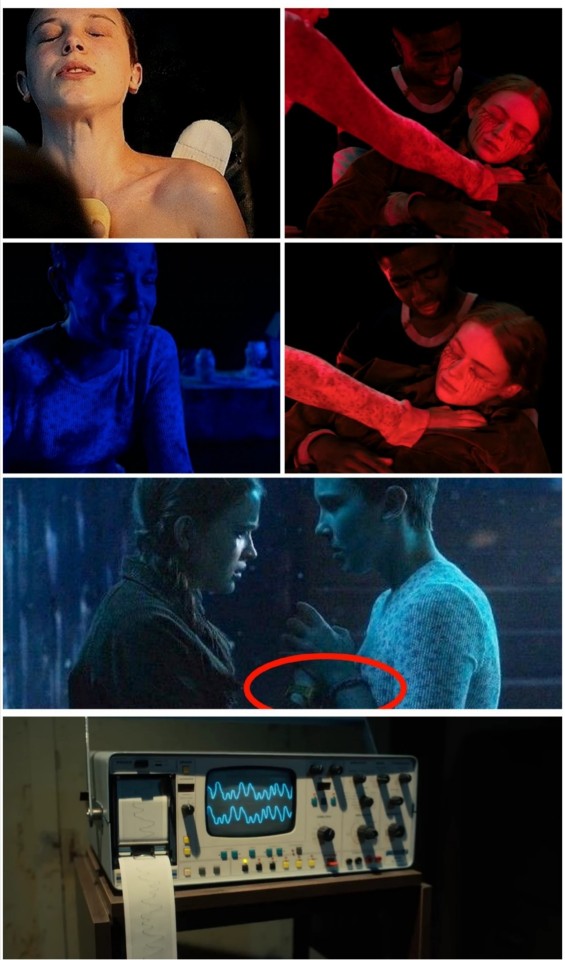
(The machine used is TECA NEUROSTAR MS-92B MS92B EMG Electromyography - probably used for the two graphs it shows and the blue & yellow buttons on it - blue and yellow. El and Max are connected through the two most consistent wardrobe choices, the blue hair tie and yellow watch)
The connections are made through several aspects: the aisle walk in the school, Running up that hill or RUTH/Ruth Nevada, the numbers like El being 5'6 and Max's trailer number being 56. - It's like this machine with blue and yellow buttons showing two very similar yet slightly different graphs, going crazy in the NINA scene when this happens:
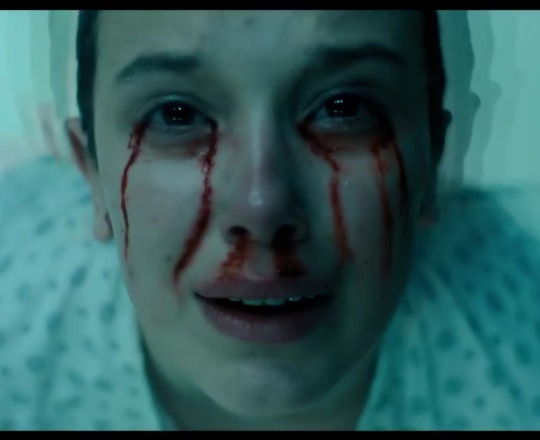
Max: 'I could be your zoomer.' - it's not even subtle you just need to make a connection. That visual is deliberate. That's an El & Max connection made through this effect.
Another interesting detail is the magazine that El is reading in S3: Tiger Beat. Combining two elements, the "tiger" as a cat (or silver cat) and "beat" as in heartbeat. Her heartbeat subtlety transcending into Max's heart monitor in the bottle scene - Max is El's heart. And El is Max's beat. She made it work again (which is underlined by the script btw).
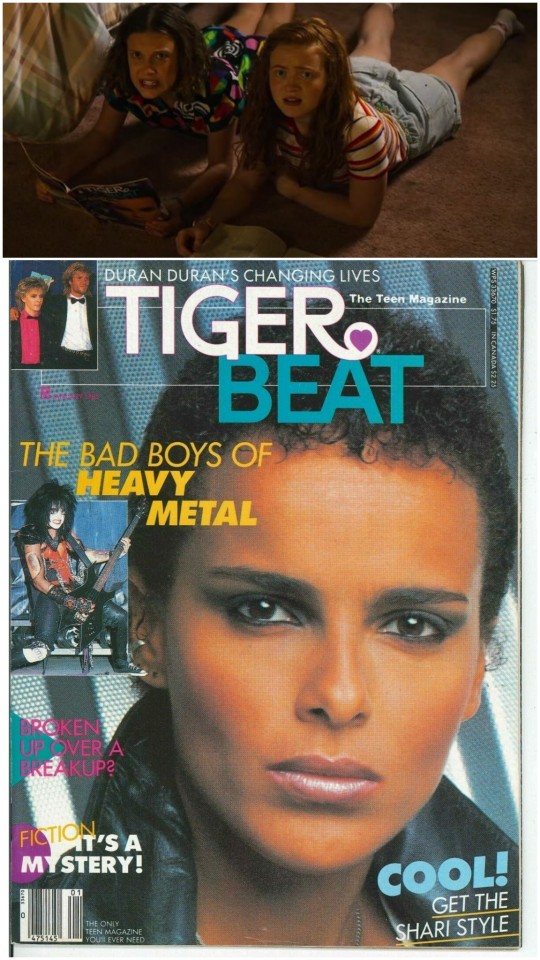
"Broken up over a breakup?" - It's worth noting that it clearly points to the fact that El and Mike had a breakup not a break. They are not together nor did they actually reunite (the Duffers are subtle and not so subtle at all at the same time when Max says "Ex-boyfriend"... but who believes a girl that gives "bad advice" - it actually wasn't bad advice more a very direct way to use dialog as a descriptive tool. And they do this all the time. It looks like bad or clunky dialog sometimes but it isn't. Dialog is code. We speak in code in general, you need a key to understand it.)
"Fiction, it's a mystery" yeah, agreed - the Duffers must have good laughs when they chose to use this. There are a few more elements but the one next to the breakup (yeah, the Duffers made it official in several ways that Mileven was dust at that point already) is the heart image "💜" that is used in the magazines uses to. Tiger/Cat - heart - beat. Like in the bottle scene.
Btw the examples I point out are not by accident in the show. The Duffers decided to use specific props from that time that fit their narrative (and certain elements may just be coincidence). Like another magazine El was reading that had a few elements in it that fit the story. That's it. It's not conspiracy, they just choose very thoroughly, very meticulously what they use as props.
Combine this imagery, the spinning of the bottle (ElMax is associated with spinning btw you know like fans that appear everywhere, hands on a clock, like time itself and the spin of particles that are entangled on a quantum level > A wrinkle in time or...a loop or better a spiral that we see in the revival), the heartbeat transitioning to Max's heart monitor and you have the visual and audio equivalent of the line "She puts a hand on Max's chest. On her heart" it's just translated into cinematic language with the heart shaped blood stain on El's shirt and her reaching out with that hand:
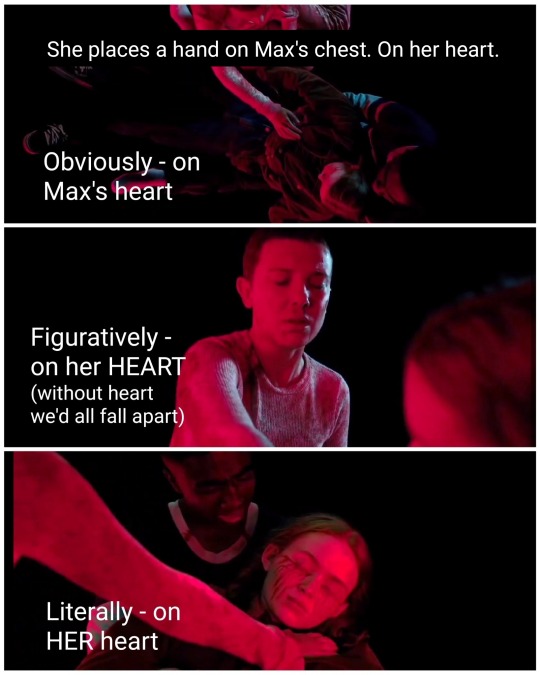
It's like later when El takes Max's hand/fingertips into hers that they again make a connection of hearts (even though we normally locate the heart on the left side, the imagery suggests that El's heart is actually on the right side.
Things can subtlety change meaning, this is true for this sentence from the script, and we can all agree that the Duffers use double or even triple meanings. I'll go into the details in another post: El is indicated to be "an angel in disguise" - Angels are spirits, ghosts. And disguise points to El's life, her whole existence is probably just a cover up (Hopper used those exact words) and what we see in her memories isn't necessarily the truth or better a version of it told from her own perspective.
That's been symbolized by her older own self image into the place of the much younger girl - since this is not the whole truth but her own point of view-version taking the place in the NINA memory, it is pretty obvious that these things happened but are taken out of context or lacking a second point of view (it's not necessarily a second timeline even though they are alluding to something like it)
Back to El and Max - they are clearly making a strong connection between them and as a narrative aspect, this goes beyond a regular ship of two girls in love. Connecting hearts, colors, dialog in this way isn't just a form of creating a cutesy ship especially with the cliffhanger ending of Season 4. It has a much more layered meaning.
"You try things on until you find something that feels like you." - "Like me?" - "Yeah. Not Hopper. Not Mike. You. " the dialog makes a full circle, so it's about something that feels like El.

El finds it. It's the same bottle that pointed to El in Max's mind. (And she has coke bottle magnets which represent two parts of half a bottle in her drawer.) "something that feels like you"
And Lucas?
El fought in the mind, Lucas in the physical world. They show us the two lovers of Max in their respective realms.
The love with El is for the mind. The love with Lucas for the physical world.
Yes, Lumax is Endgame - so is ElMax. And there's only one way to do it. El has to be the cure for Max. Max is El's heart. Quite literally. The Friday movie date has to happen, that's a simple writing technique, a promise which you probably can't see right now because Max is blind. However, never ask IF such an obvious lose thread is taken up by the writer, don't ask IF something will happen, ask HOW and WHY. It's not a simple answer, nothing necessarily lighthearted. Nonetheless it's quite moving and beautiful.
Btw if Byler is a romantic ship and a driving factor, so is ElMax. The latter definitely not fanon but canon without saying it out loud and thereforen ElMax gives Byler another reason to exist (although I think that Byler too will come with a catch). You could prove one with the other by not trying to get El out of the way but think about who she really loves.... El was never really in a relationship only what she thought it was and this even ended in Season 3 (remember that Max points out that Mike is El's ex-boyfriend?) and I like to quote Madeleine L'Engle: If we commit ourselves to one person for life, this is not, as many people think, a rejection of freedom; rather, it demands the courage to move into all the risks of freedom, and the risk of love which is permanent; into that love which is not possession but participation.
Just my 2 cents.

........................
PS: this post had several versions and English isn't my first language. So, sorry for potential errors I overlooked.
PPS: Givehimthemedicine post about hearts:
#elmax#max mayfield#stranger things#el hopper#elmax nation#elmax my beloved#elmax supremacy#elmax is endgame#elmax is real#stranger things analysis#elumax#eleven stranger things#max x eleven#eleven and max#eleven hopper
26 notes
·
View notes
Text
Translator's note on suzuracles post-wedding dialogue
It's hard to direct-translate Suzume's tone indicators to English so I could only do my best to imitate her playful tone at the end of each sentence (even though the content/first half is serious she kept the lovestruck persona ending it in "wah~!")
This passage is a bit difficult to me so I checked the dictionary twice. I spent a long time on Suzume's last line. I can't be sure if it is i-u-hou (the speaker) or i-u-kata (the tone+diction) but combining Suzume's tone I think it's the latter one. And, "tsumi". I'm aware of the better-known from W as "sins" but the word has duality and what is sinful may not be illegal, what is illegal may not be sinful (off-track). And we are talking about a morally grey character.
Analysis
The most intriguing suzuracles to me is, they might be the closest in position in terms of sacrificing their personal self for their country, to present a public persona yet they could never confide in anyone, not even to each other, especailly not, even though they knew the other is in the same position as themself. Yet, they have lived under the same roof with each other longer than they did with their own family. That real? not real? love into hatred? hatred into love? into mutual understanding? The quantum state of it is the most captivating to me for them as foils.
I think Suzume is conscious in keeping referring to Racules as "Racules-sama" instead of in second person to keep a distance between them. Let alone "anata" in the "[my] husband" sense. It's okay to love "Racules-sama", it's easy to play the innocent captive of "Racules-sama", but she has seen Racules. Late at night, in between schemes, behind polite threats. Can one fully hate a worthy opponent?
observations:
ラ 「間に合わせだ。売ったところで二束三文にしかならな���」
ス 「私を何だと思ってらっしゃるの!?私とラクレス様の愛の結晶に、値段などつけられませんわ」
Racules is testing Suzume. He has no need to play games with her. He knew she was there for Toufu to profit from the start (alt-shugod aid to Toufu in wake of Wrath of Gods).
Translated: Hold on to the ring (game-changer item)
ラ 「…時に君の正気を疑うことがある」
ス 「無理もありません。ラクレス様への愛が、私を狂わせるんですもの!」
ラ 「愛ではなく、憎しみだろう。スズメ・ディボウスキ」
Racules is letting himself show, if a little, if vulnerability, to gain her trust? Suzume DYBOWSKI. DYBOWSKI. THIS MAN CALLED HIS NEWLY WEDDED WIFE HER FAMILY NAME. He knows Suzume will always put Toufu/Dybowski before him or Shugoddom, but she's the only one he can count on now. Because she said it herself, her devotion (to "Racules-sama") is mad unwavered.
ラ 「国のため、道具にされ続け、それでも正気でいられる道理は何だ」
Convince me Racules is not talking about himself. Do, try.
ス 「…トウフの女は、地に足ついてこそ。信ずる道を、踏み外したりはしませんわ」
This line is so hardcore?? More importantly, I can totally see Kamura-san's delievery. Quiet at first, the cold in her eyes, then the naive switch grin at the end!
ラクレスがふっと微笑む。 ラ 「やはり度し難いな」
Suzume managed to make Racules smile! It doesn't specify if he was amused or relieved Suzume caught his metaphor. This is what we are talking about the actor filling in for the script. Then Yano-san's performance can be interpreted a thousand ways based on each viewer! A more literal translation of 度し難い is "beyond help". I think it can also mean the person is beyond salvage as in nothing can change their determination (positive). Racules is talking about himself too! if wryly!
Translated: "you are part of my plan. don't ever change."
ラ 「その指輪は、太陽を浴びて輝く。目を焼かれぬよう、気をつけろ」
Racules-sama, can you be more obvious. Put the wedding ring under the sun to read my secret message, just like I did with what Vetaria left me in my spin-off. The fire imagery!! (re: inferno, re: takamina's "he who shines on the world must burn himself to do so" tweet!!)
#racules husty#suzume dybowski#kingohger#kingoh meta#mon mon#good night#i keep telling myself 'nah it's just turn off the month all the Racules hype is just part of regular monthly new info hype'#not Takamina joining in on the fun too!#but yeah racules suzume the one who closest yet furthest#i don't mind if they ever loved each other but theis relationship is SO intriguing to me#long post
49 notes
·
View notes
Text
Ok, while Skirk's design seems to fail at the whole "battle hardened warrior that adopted and mentored baby Ajax", mostly because she looks twenty and seems to lack scars, it can still be used as a way of showing the effects of the Abyss.
Like, maybe she lacks scars because the Abyss doesn't fall under Istaroth's rule, lacking the concept and passage of time, forcing all abyssal beings to remain stagnant, with not even a single trace, be it a scar or even a nick in one's blade, to indicate the passage of time. Nothing but the ever-growing mental toll and corruption.
As for the fact that she looks twenty, well, I think it's a cool spin on her role as Childe's mentor. Where, instead of being an old and wise warrior, or an actual parent, she is basically an older sibling trying to act as a responsible adult. She has experience fighting the Abyss, but is still only barely older than Ajax and is doing her best to teach him and keep him safe.
As for the outfit.... Yeah, that's just HI3. The best I can do is say that they're technically dealing with the Dark Sea and/or Primordial Sea, so a swimsuit makes sense.
#genshin impact#skirk#childe genshin impact#love the design though#blue and black just works really well with the white hair#hopefully they can spin this whole “eternal youth” into a bad thing#along with all the trauma that cones from the abyss#trapped in abyss for 500+ years and still can't legally drink because you look like a teenager#that's the Fu hua curse#exceot hua didn't fall in the sea of quanta
29 notes
·
View notes
Text
The Ghosts That Haunt Us Still
From: @grollow
To: @reveks
Note: Hi Zye. I know how much you liked 'graves, you see, are for the living.' When I got assigned you, I couldn't resist writing you a sequel. It may not be the cheeriest thing for the season, but something tells me it'll tickle your fancy nevertheless. Happy holidays, friend!
((Sequel to: https://archiveofourown.org/works/44721973))
Written work under readmore
The Ghosts That Haunt Us Still
By Rhysa (tumblr user: grollow)
“Someone once told me that graves were for the living,” Revek murmured. “That they were imbued with memories.” He turned toward his companion, a small figure cast in shadow. “And that’s all that I am now, isn’t it? Memories.”
The moth did not look up. She held in her hands a small jar full of lumaflies, dancing brilliant blue and violet. The captives fluttered about and illuminated the glade, though in truth, Revek knew that she needed no such guidance. Long gone were the days when the moths walked in the light of the morning. Night was their constant companion now, and she their shepherd in the dark, the last Seer of her tribe, the last to remember their teachings when history would erase it all.
And the moths themselves would be little more than memories.
Would they, too, get graves?
Would he visit them, as he had during their first meeting?
“You are an echo,” she answered, crouching before one of the stones. It was stained grassy-green along the base and over the top of what was once polished marble, there was a thin layer of grime that indicated that particular marker had not been visited in some time. Seer raised one hand and gently rubbed away the film, the pads of her fingers polishing the long-forgotten stone. “Remnants of the person who Revek once was. His last thoughts, his dreams, unresting. You died with purpose unfulfilled, and essence sees fit to make you real. To give you a chance at letting your regrets fade away.”
Regrets. Did he have any?
In life, his purpose had been to protect the Glade; he’d been tasked with the instruction of preventing anyone from desecrating the markers there. He served that function still, a lingering specter haunting his own grave marker. Was that not his purpose?
“What are your intentions here?”
“To pay respects to the dead. Is that not why everyone visits a mausoleum?”
His tone.
(He’d said his name was Grimm.)
He’d sounded so smug, revealing that the moths would not dream of denying him passage anywhere that he wished. How whimsical and strange that butterfly had been—darting about with ease as if he were not surrounded by monuments to grief, as if he felt nothing at all about the loss that those who buried their own in the soft earth undeniably felt. With poetically cryptic half-truths, he’d flitted to-and-fro; he’d said that he came to pay his respects, but Revek hadn’t seen any stone that Grimm had actually stopped at.
“Do you believe in omens, Seer?” the spider asked, his claws playing along the hilt of his nail. “Signs of what is to come? Your name would certainly suggest that you do.”
She angled one antenna his way, curious, before turning from the stone that she was looking at. The name read ‘Thistlewind.’ It was an old stone, one he recalled seeing even when he was alive.
(But his memories could be obscured by knowledge that he now possessed. He was an echo, after all, the lingering embodiment of unrest—he was a ghost, not the real Revek.
Wasn’t he?)
“Is there a reason that you find yourself curious, restless one?” she asked. The tone of her voice indicated that she knew more than she’d let show. “An answer that you seek?”
He shifted, secondary legs writhing beneath the cloak that he wore. He angled his mask downward. Beneath Seer, there grew rich tangles of clover in place of grass; it folded over onto itself prettily, a mat to cover the resting place of the moth that was buried beneath.
He’d seen Thistlewind before, but never had they spoken.
“Who does Grimm come to the Glade to visit?”
The name spurred a reaction: violet antennae folded downward, and Seer turned away from Revek to walk through the grounds. She dropped a small yellow flower on the top of Thistlewind’s grave, but that was not the only one that Seer decorated. No, each that she passed, she laid a bloom on, though only the moth received yellow—the rest got diminutive white flowers. This was a custom from the elderly moth; he’d seen her participate in this ritual numerous times. It seemed to bring her comfort.
She did not answer him.
“I have opened the doors to the Glade,” Seer said instead. “To allow visitors. The wielder my people seek has arrived, and it will doubtlessly find its way here, to witness those who came before. I would ask you to treat it courteously, my friend. If we are lucky, it will set us both free.”
Revek had never considered himself a captive. His duty was absolute: it persisted through death.
(It wasn’t his duty that bound him to the living world. He knew that. It was the unanswered questions, and the feeling that there was more—far more—to that one encounter.
He’d thought of it often. Dreamt of those scarlet eyes more than once.
He was a ghost, but it was that phantom that haunted him.)
He followed her. It was unnecessary. Seer knew her way around the Glade better, perhaps, than even he did. Her people had built them, and her people would maintain them even when his duty had finished.
(Would it ever be done?
Would he ever be free?
…would he ever see him again?)
Grass and moss hung from branches that jutted out through the canyon walls. Sheets of them braided downward like ropes of color dotting their path, and as they moved to darker portions of the Glade, Seer stopped and unscrewed the lid of her jar. Her hands went up and she held it gently into the air for the captured lumaflies to fly free and fly they did: they wove themselves through the sky in an immaculate performance, like starlight constellations in cool twilight hues, throwing shadows across the stones.
Revek watched them silently.
And Seer, also gazing at them, finally deigned to answer.
“Many have family buried in these lands. The one that you call ‘Grimm’ is no exception to this rule. He comes to grieve for his sister, who is not so much buried here, but symbolically, this place represents her death nevertheless.”
“His sister…?”
He’d vanished. He hadn’t visited any of the stones—though, if it was symbolic, perhaps that was why. Revek fidgeted uncomfortably, though, for the way that she worded her statement suggested that Grimm was not his real name.
(He’d said that it was.)
“He called himself a spiritualist,” Revek murmured. “The one time that we met. I did not know what that meant at the time.”
“He comes back once in a lifetime to this place. But soon more, I expect,” Seer answered. She turned toward him. His mask hid his confusion, he knew, but the way that she regarded him was one of idle amusement. “How fitting, that a ghost would be so interested in a psychopomp.”
“A…what?” Revek asked.
The moth fluttered her wings, and she looked back at the entrance of the Glade in quiet contemplation. She curled her hands along her elbows, tension settling in her wings. There was a quiet distance in her demeanor that he did not fully understand.
“A psychopomp. They are creatures who carry the spirits of the dead from one world to the next. And that is what he is, guardian: a psychopomp, summoned here to carry Hallownest itself away.” She did not sound happy about it. “He makes his lair above, in that sleepy village, but he will not stay there. He’ll come here, and when he does, you can ask him yourself who his sister is—who it is he mourns, and where.”
The moth stepped away and left Revek staring at her wings as she departed. He should have followed her, but the revelation that Grimm was in Hallownest felt like he’d had the oxygen ripped from his lungs.
He’d come back. He’d said that he would, that he did. He’d come back and—
And Revek was dead. The real him didn’t exist anymore.
But he could not shake the warmth that spread through him at her words and the realization of what they meant. That the strange butterfly might come back. That Revek might see him again.
And that maybe… if he was a ‘psychopomp,’ he might find time in his day for a ghost.
“We will see, I think, how sincere your words are. About how memorable you find my eyes.”
20 notes
·
View notes
Text

Appendix X: The Origin of the Guilds
The origin of the guilds has been the subject of many controversies. There is not the slightest doubt that craft-guilds, or “colleges” of artisans, existed in ancient Rome. It appears, indeed, from a passage in Plutarch that Numa legislated about them. “He divided the people,” we are told, “into trades... ordering them to have brotherhoods, festivals, and meetings, and indicating the worship they had to accomplish before the gods, according to the dignity of each trade.” It is almost certain, however, that it was not the Roman king who invented, or instituted, the trade-colleges — they had already existed in ancient Greece; in all probability, he simply submitted them to royal legislation, just as Philippe le Bel, fifteen centuries later, submitted the trades of France, much to their detriment, to royal supervision and legislation. One of the successors of Numa, Servius Tullius, also is said to have issued some legislation concerning the colleges.[319]
Consequently, it was quite natural that historians should ask themselves whether the guilds which took such a development in the twelfth, and even the tenth and the eleventh centuries, were not revivals of the old Roman “colleges” — the more so as the latter, as seen from the above quotation, quite corresponded to the mediæval guild.[320] It is known, indeed, that corporations of the Roman type existed in Southern Gaul down to the fifth century. Besides, an inscription found during some excavations in Paris shows that a corporation of Lutetia nautæ existed under Tiberius; and in the chart given to the Paris “water-merchants” in 1170, their rights are spoken of as existing ab antiquo [from ancient] (same author, p. 51). There would have been, therefore, nothing extraordinary, had corporations been maintained in early medieval France after the barbarian invasions.
However, even if as much must be granted, there is no reason to maintain that the Dutch corporations, the Norman guilds, the Russian artéls, the Georgian amkari, and so on, necessarily have had also a Roman, or even a Byzantine origin. Of course, the intercourse between the Normans and the capital of the East-Roman Empire was very active, and the Slavonians (as has been proved by Russian historians, and especially by Rambaud) took a lively part in that intercourse. So, the Normans and the Russians may have imported the Roman organization of trade-corporations into their respective lands. But when we see that the artél was the very essence of the everyday life of all the Russians, as early as the tenth century, and that this artél, although no sort of legislation has ever regulated its life till modern times, has the very same features as the Roman college and the Western guild, we are still more inclined to consider the eastern guild as having an even more ancient origin than the Roman college. Romans knew well, indeed, that their sodalitia and collegia were “what the Greeks called hetairiai” (Martin-Saint-Léon, p. 2), and from what we know of the history of the East, we may conclude, with little probability of being mistaken, that the great nations of the East, as well as Egypt, also have had the same guild organization. The essential features of this organization remain the same wherever we may find them. It is a union of men carrying on the same profession or trade. This union, like the primitive clan, has its own gods and its own worship, always containing some mysteries, specific to each separate union; it considers all its members as brothers and sisters — possibly (at its beginnings) with all the consequences which such a relationship implied in the gens, or, at least, with ceremonies that indicated or symbolized the clan relations between brother and sister; and finally, all the obligations of mutual support which existed in the clan, exist in this union; namely, the exclusion of the very possibility of a murder within the brotherhood, the clan responsibility before justice, and the obligation, in case of a minor dispute, of bringing the matter before the judges, or rather the arbiters, of the guild brotherhood. The guild — one may say — is thus modelled upon the clan.
Consequently, the same remarks which are made in the text concerning the origin of the village community, apply, I am inclined to think, equally to the guild, the artél, and the craft- or neighbour-brotherhood. When the bonds which formerly connected men in their clans were loosened in consequence of migrations, the appearance of the paternal family, and a growing diversity of occupations — a new territorial bond was worked out by mankind in the shape of the village community; and another bond — an occupation bond — was worked out in an imaginary brotherhood — the imaginary clan, which was represented: between two men, or a few men, by the “mixture-of-blood brotherhood” (the Slavonian pobratimstvo), and between a greater number of men of different origin, i.e. originated from different clans, inhabiting the same village or town (or even different villages or towns) — the phratry, the hetairiai, the amkari, the artél, the guild.[321]
As to the idea and the form of such an organization, its elements were already indicated from the savage period downwards. We know indeed that in the clans of all savages there are separate secret organizations of warriors, of witches, of young men, etc. — craft mysteries, in which knowledge concerning hunting or warfare is transmitted; in a word, “clubs,” as Miklukho-Maclay described them. These “mysteries” were, in all probability, the prototypes of the future guilds.[322]
With regard to the above-mentioned work by E. Martin-Saint-Léon, let me add that it contains very valuable information concerning the organization of the trades in Paris — as it appears from the Livre des métiers of Boileau — and a good summary of information relative to the Communes of different parts of France, with all bibliographical indications. It must, however, be remembered that Paris was a “Royal city” (like Moscow, or Westminster), and that consequently the free medieval-city institutions have never attained there the development which they have attained in free cities. Far from representing “the picture of a typical corporation,” the corporations of Paris, “born and developed under the direct tutorship of royalty,” for this very same cause (which the author considers a cause of superiority, while it was a cause of inferiority — he himself fully shows in different parts of his work how the interference of the imperial power in Rome, and of the royal power in France, destroyed and paralyzed the life of the craft-guilds) could never attain the wonderful growth and influence upon all the life of the city which they did attain in North-Eastern France, at Lyons, Montpellier, Nimes, etc., or in the free cities of Italy, Flanders, Germany, and so on.
#organization#revolution#mutual aid#anarchism#daily posts#communism#anti capitalist#anti capitalism#late stage capitalism#anarchy#anarchists#libraries#leftism#social issues#economy#economics#climate change#anarchy works#environmentalism#environment#solarpunk#anti colonialism#a factor of evolution#petr kropotkin
16 notes
·
View notes